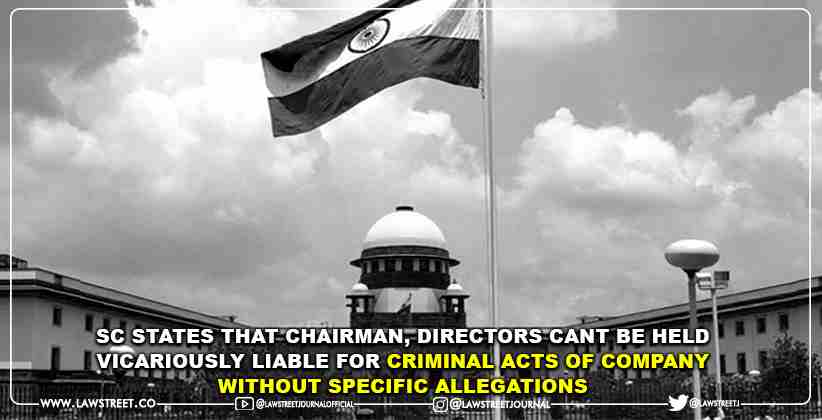On 27th September 2021, the Supreme Court in the case of Ravindranatha Bajpe v. Mangalore Special Economic Zone Ltd. held that the company officials like Chairman, Managing Director etc., cannot be held vicariously liable for the criminal offences committed by the company unless there are specific allegations against them which signify that they had an individual role in the activity.
CONTENTIONS OF THE PLAINTIFF
The petitioner held that the accused have conspired with each other to lay the pipeline under the property of the appellant without having any legal right and authority.
Furthermore, the petitioner held that the accused had trespassed over the scheduled properties and even demolished the compound wall along with cutting the trees.
It was contended by the petitioner that the accused had a common intention to destroy his property and therefore while laying the pipeline and demolishing the trees and compound wall on the scheduled properties they had committed criminal trespass and criminal damage.
In the prayer, the petitioner held that the trial court should take cognizance against the accused, and should issue a process against the accused.
ORDER OF THE JUDICIAL MAGISTRATE, FIRST CLASS
The Judicial Magistrate, first-class of Mangalore passes an order stating that cases should be registered against all the accused from accused 1 to 13, in which accused 1 and 6 were Companies and accused 2 to 5 and 7 to 13 were prominent officers or employees of the company.
The cases were registered for the offences punishable under Section 427 (mischief causing loss to property), 447 (criminal trespass), 506 (criminal intimidation) and 120B (criminal conspiracy).
CONTENTIONS OF THE ACCUSED
The accused 1 to 9 before the Sessions Court appealed for criminal revisions petitions.
The Sessions Court allowed the appeal and quashed the order passed by Magistrate.
The accused held that there were no specific allegations against the top officers or employees of the company and the only point against the accused was the bald statement.
It was further held by the accused that the Supreme Court in a plethora of cases has held that the issue of summons/ processes is a serious task and therefore, the Magistrate should not have issued the process since there were no specific allegations against any of the accused.
CONTENTIONS IN THE SUPREME COURT
The High Court confirmed the order of the Sessions Court and quashed as well as set aside the order of the Magistrate Court.
The Complainant held that the High Court and the Sessions Court had erred in giving the judgement by quashing the order of the Magistrate. It was also held that there was a specific allegation against the accused no. 1 to 8 that they had conspired against the petitioner and therefore at the stage of issuing processes the revisional court could not have interfered with the order passed by the Magistrate summoning the accused.
It was submitted that since they are the administrators of the companies all the executives are vicariously liable.
The accused held that the Supreme Court in various cases such as Sunil Bharti Mittal v. Central Bureau of Investigation, Maksud Saiyed v. State of Gujarat and GHCL Employees Stock Option Trust v. India Infoline Limited, that there need to be specific allegations against the accused of the issuing of process, and the role of each person needs to be attributed for framing of charges.
JUDGEMENT OF THE SUPREME COURT
The Supreme Court held that just on the basis of the fact that accused no 2 to 5 and 7 and 8 are Chairman/ Managing Director/ Deputy General Manager cannot be held vicariously liable unless there are specific allegations and averments against them with respect to their individual role, the Court held.
The Supreme Court also observed that the High Court and the Sessions Court have rightly passed the order by dismissing the revision pleas and setting aside the order passed by the Magistrate. The Order of the Sessions Court and High Court was upheld by the Supreme Court.








